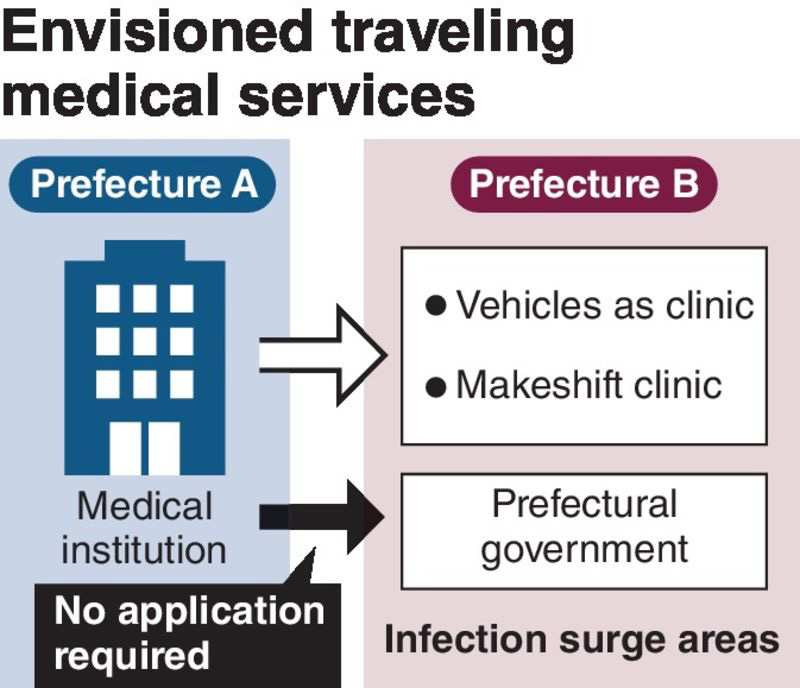Japan looks to deregulation to boost medical services ahead of possible next COVID-19 wave

16:49 JST, December 27, 2021
In preparation for a possible sixth wave of infections with the novel coronavirus, the government plans to promote “traveling medical services” to allow doctors and nurses to provide care across prefectural borders, it has been learned.
Related regulations will be eased as early as next month to allow such services to be offered without having to seek permission from a prefectural government.
By eliminating the procedures required to start medical services across prefectural borders, the government is seeking to create conditions for health care workers to support areas where the medical care situation might become tight due to a surge in COVID-19 cases.
The government is making arrangements for the Health, Labor and Welfare Ministry to notify prefectural governments of the deregulation in January.
In the envisioned traveling medical services, doctors and nurses belonging to medical institutions will visit areas in other prefectures and set up makeshift clinics in vehicles or at such places as community halls or unused spaces in schools.
Unlike home visits in which doctors and nurses appear at a person’s residence, the new service will be considered as the “establishment of a clinic” under the Medical Service Law.
Currently, when a medical institution seeks to offer medical services in an area outside the prefecture it is based, the institution needs to apply to the destination prefectural government to set up a clinic. In addition, a service plan, specifying such information as date, location, names of doctors and type of treatment, has to be submitted to that prefectural government in advance. Service at each specific location is limited to a two-day period per week.
In general, it is said that it takes about a month between filing an application and receiving permission. This has led to the argument that regulations are hampering flexible responses to changes in the infection situation. In response to a request by the government’s Council for Promotion of Regulatory Reform to study the matter, the health ministry concluded deregulation is possible.
If the deregulation is realized, a medical institution that wants to start a traveling medical service does not have to file the application with the destination prefectural government and service plans can collectively be submitted “at an appropriate time” after medical care is provided. The limitation for the number of days at a single location will also be lifted.
It is assumed the envisioned services will mainly treat COVID-19 patients. PCR tests and other treatments will also be provided to asymptomatic people. Also, a system will be put into use where only nurses travel and doctors provide diagnosis online from base medical institutions.
Top Articles in Society
-

Man Infected with Measles Reportedly Dined at Restaurant in Tokyo Station
-

Man Infected with Measles May Have Come in Contact with Many People in Tokyo, Went to Store, Restaurant Around When Symptoms Emerged
-

Woman with Measles Visited Hospital in Tokyo Multiple Times Before Being Diagnosed with Disease
-

Australian Woman Dies After Mishap on Ski Lift in Nagano Prefecture
-

Foreign Snowboarder in Serious Condition After Hanging in Midair from Chairlift in Nagano Prefecture
JN ACCESS RANKING
-

Japan PM Takaichi’s Cabinet Resigns en Masse
-

Japan Institute to Use Domestic Commercial Optical Lattice Clock to Set Japan Standard Time
-

Israeli Ambassador to Japan Speaks about Japan’s Role in the Reconstruction of Gaza
-

Man Infected with Measles Reportedly Dined at Restaurant in Tokyo Station
-

Videos Plagiarized, Reposted with False Subtitles Claiming ‘Ryukyu Belongs to China’; Anti-China False Information Also Posted in Japan





















